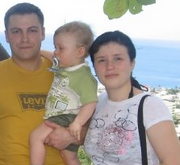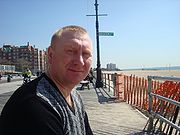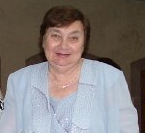From The Peopling of New York City
Contents |
Statement of Use
These interviews are strictly for educational purposes and will not be used against any of the interviewers. We are performing a lot of demographic research in my honors seminar class and this assignment is supposed to help us gain interview skills and knowledge on immigration that we will need for future interviews. The immigration questions will be based on everything from immigration experiences to reasons for immigrating and going to Staten Island. If any of the interviewers were uncomfortable answering a question or just didn't have an answer, they were free to not answer it and a new question was asked.
Larisa Barbashova
Yuriy Chepelova
Yuriy Chepelova only recently immigrated to the United States. He is originally from Yakutsk, Russia and has been living on Staten Island since March 2010. Many times a family member must obtain green cards in order to move a family member to another country. Such was the case with Yuriy, whose sister won a green card for him and his family to move to America.
However, Yuriy’s immigration has not been a walk in the park because he had to come to America without his family. According to him they will be joining him this summer.
In the mean time Yuriy works in New Jersey for a company that provided him with housing, which is very difficult to obtain when moving from one country to another.
Yuriy’s main reason for coming to America was the idea of ultimately making more money than he was able to make in Russia. He had previously heard a lot of great things about America from his sister and his mother who are both proud citizens of the United States.
Ester Beygel
Many times we as Americans take many of our natural, democratic rights for granted. Our rights have become so intuitive that we cannot begin to imagine a world where practicing our beliefs comes with a price. However, Ester Beygel knows what the cost of freedom is because she has seen the oppression of her natural rights as a citizen of the Soviet Union and then Russia. This was the exact oppression that caused her to take my mom, my dad, my brother, and me to America where we were promised to have a greater chance at a better life.
She was born in August 1937 in Moscow, Russia to a Jewish family that was hit with numerous difficulties starting with the death of her mother. Growing up in Soviet Russia during the World War II era and having lost relatives in German concentration camps, my grandmother knew what it felt like to be ostracized for being a Jew. The switch from Soviet Russia to Russia was supposed to be revolutionary and beneficial for all Russian citizens. However, that was not the case for most of Russia’s population during the 1990s. Zhirinovsky, who was the founder of the Liberal Democratic Party of Russia and a half Jew, advocated anti-Semitism. He had a lot of Russian nationalist followers who wanted to go on a Jewish killing spree called the Night of Knives, but it was accidently uncovered.
All immigrants have certain push factors that make them get up and move to a better-suited country for their lifestyle; for my grandmother the push factors were her family’s safety and religious freedom. My grandmother recalled “being in a construction site where they were building a statue of victory and there was a guy there that said if I had a machine gun right now I would shoot all of the Jews in Russia.” It was at that moment Ester understood that she had to take her children and grandchildren and leave Russia.
The economy in Russia was the second reason for Ester emigrating to America. There was a system of rationing, similar to the World War II era, where everything was bought with limited amounts of ration cards. There was about 2 kilograms of sugar allotted for each person every month. All of the small stores that existed were empty and lifeless and there was no system that would improve the economy and bring necessities to all Russian citizens. People waited hours on a line for necessary hygienic products. “When my grandson got hit by a car, the ambulance had no products to treat his breaks and cuts. We had to get bandages and ointments from all over our building,” said my grandmother.
The Ruble, the Russian currency, was drastically falling in value and peoples’ pensions were very small. In fact, while describing the difficult economic times she faced in Russia, my grandmother recalled that “the government annulled all of our life savings and we no longer had anything to live on. To make matters worse, my daughter and son-in-law, who were both educated people with degrees, were out of a job.”
America was a free democratic nation− a nation of immigrants where each individual person can make their own living and their own future− and consequently the perfect place for my grandmother to immigrate to. According to my grandmother, my father had all of his aunts and cousins living in America that were all willing to help us. They helped Ester find an apartment to accommodate my whole family and gave us furniture. My grandmother said that one of my dad’s cousins even went as far as giving him a job in his private business.
In the usual progression for New York immigrants, Ester moved her family from an apartment flat in Brooklyn to a house in Staten Island that she helped her children buy. “Technically speaking we achieved the American dream; we became homeowners with cars and the opportunity to travel and earn a decent income to support our family,” stated Ester about her overall immigration experience to America.


